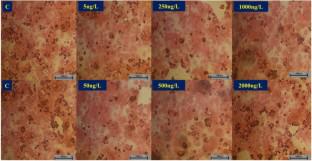Mycotoxin Research ( IF 3 ) Pub Date : 2023-10-04 , DOI: 10.1007/s12550-023-00505-2 Lal Krishan Kumar 1 , Surya Kant Verma 1 , Rajeev Chandel 1 , Meet Thumar 1 , Dheer Singh 1 , Suneel Kumar Onteru 1

|
Aflatoxin M1 (AFM1) is a mycotoxin that is commonly found as a milk contaminant, and its presence in milk has been linked to cytotoxicity. The present study aimed to evaluate the acute cytotoxic effects of AFM1 on intestinal Caco-2 cells. Initially, we checked the morphology and viability of Caco-2 cells after treatment with different concentrations of AFM1 (5 ng/L, 50 ng/L, 250 ng/L, 500 ng/L, 1000 ng/L, and 2000 ng/L) for different time intervals (6 h, 12 h, and 24 h). It was found that AFM1 did not show any effect on cell morphology, but 10% decrease in viability above 1000 ng/L after 12 h. Furthermore, DCFDA assay showed increased ROS production after 6 h treatments. qPCR analysis showed an increased expression of epithelial-specific cytoskeleton marker genes, Cytokeratin, Villin, Vimentin, and JAM-1, and a decreased expression of tight junction protein genes, Claudin-1, Occludin, and ZO-1. Similarly, we found an increased expression of Cyp1a1 transcript with an increasing AFM1 concentration and incubation time. This gene expression analysis showed AFM1 can cause disruption of tight junctions between intestinal cells, which was further confirmed by a transwell experiment. In conclusion, consumption of AFM1-contaminated milk does not show any effect on cells morphology and viability but decreases the expression of intestinal barrier transcripts that may lead to the disruption of intestinal barrier function and leaky gut.
中文翻译:

黄曲霉毒素 M1 降低编码紧密连接蛋白的基因表达并影响肠上皮完整性
黄曲霉毒素 M1 (AFM1) 是一种霉菌毒素,通常作为牛奶污染物被发现,其在牛奶中的存在与细胞毒性有关。本研究旨在评估 AFM1 对肠道 Caco-2 细胞的急性细胞毒性作用。最初,我们检查了用不同浓度的 AFM1(5 ng/L、50 ng/L、250 ng/L、500 ng/L、1000 ng/L 和 2000 ng/L)处理后 Caco-2 细胞的形态和活力。 L) 不同的时间间隔(6 小时、12 小时和 24 小时)。结果发现,AFM1对细胞形态没有表现出任何影响,但12小时后活力在1000 ng/L以上下降10%。此外,DCFDA 测定显示处理 6 小时后 ROS 产量增加。qPCR 分析显示上皮特异性细胞骨架标记基因 Cytokeratin、Villin、Vimentin 和 JAM-1 的表达增加,而紧密连接蛋白基因 Claudin-1、Occludin 和 ZO-1 的表达减少。同样,我们发现随着 AFM1 浓度和孵育时间的增加,Cyp1a1 转录物的表达增加。该基因表达分析表明,AFM1 可以导致肠细胞之间的紧密连接破坏,这一点得到了 Transwell 实验的进一步证实。总之,食用 AFM1 污染的牛奶不会对细胞形态和活力产生任何影响,但会降低肠道屏障转录物的表达,从而可能导致肠道屏障功能破坏和肠漏。



























 京公网安备 11010802027423号
京公网安备 11010802027423号